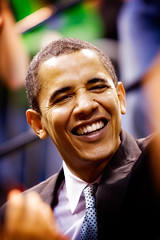Them: Where in America are you from?

Me: Actually, I’m Canadian. (sympathetic smile)
Them: Oh! (look of horror). I’m so sorry, I know that’s a huge insult.
Me: No, that’s OK, don’t worry. It happens a lot.
With Obama in the White House, I anticipate there will be less apologies, more “Do you guys really have polar bears?” questions (I’ve gotten a few of those). But I genuinely imagined the perception of Canadians by Brits was pretty favourable.
This article was a rude awakening. It's about Obama’s visit to Canada yesterday.
Canada is an interesting testing ground for the theory.Now, I’ll forgive the Harper comment because God knows he’s not the most awe-inspiring figure to ever grace Canadian politics, but really? Canada “doesn’t really seem to do mania.” Ever heard of a little thing called Trudeau-mania? The word is built in the title!
On the one hand, Canadians appear to like Mr Obama rather more than they like their own politicians - he has scored approval ratings here of nearly 90%.
On the other, reasonable, multilateralist, compromise-loving Canada doesn't really seem to do mania. You imagine the arrival of the Beatles here would have provoked civilised curiosity, and performances by the early Elvis might have prompted polite applause.
Canadian Prime Minister Stephen Harper is a Conservative who leads a minority government, and it would be fair to say that he has avoided the temptations of charisma in doing so.
Boring, they think we're boring. They may not have said it in so many words. But that first sentence is the journalistic equivalent of "You're a big fat fuddy duddy!" This is the only time that I’ve ever actually wanted to comment on a news story. Wisely, the BBC doesn’t have that feature available. Otherwise I would have made severe use of it!
DISCLAIMER: No offense is meant by the cultural references above.






